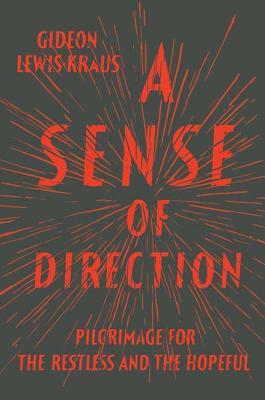A Sense of Direction
by Gideon Lewis-Kraus
Riverhead, 352 p.
What makes Gideon Lewis-Kraus walk? That’s the central question of the young writer’s memoir, A Sense of Direction. You find yourself asking why the perpetually uprooted Lewis-Kraus finds himself globe trotting; what he’s looking for, and if he’s ever going to find it. Kraus is the type of soul that Henry David Thoreau would have enjoyed, a guy who is a savant in what the 19th century transcendentalist poet and philosopher referred to as the “art of walking.” But while Thoreau concerned himself with the natural surroundings of his native Massachusetts, Lewis-Kraus focuses on a mix of family-inflicted mental maladies, existential boredom, and good old-fashioned shpilkes.
The way he starts things off, Lewis-Kraus would have you believe he’s some restless soul that can’t sit still for more than a second. He has a cushy situation living on the cheap with his savvy brother Micha in San Francisco, calling the time one of the happiest of his life, when suddenly Lewis-Kraus finds himself trying to remember the last time he did anything exciting. “So on the one hand you want to go to Berlin to do nothing at all, and on the other hand you want to go to further your ambition,” his brother points out to him. Lewis-Kraus answers that by applying for a Fulbright to write an essay on contemporary young German novelists, gets it, and begins his adventure.
Germany, full of cigarettes and other aimless souls, doesn’t prove to be the elixir for the writer’s itch. Lewis-Kraus joins a “new Lost Generation” that he initially thought of as “terribly cliché” but who eventually show him that he wants something more. The Berlin of A Sense of Direction isn’t portrayed as glamorous like early 1920s Paris that we hear so much about; the one that lured American writers and artists like Ernest Hemingway and F. Scott Fitzgerald away from home. But before it gets stale, Lewis-Kraus is off to trek the Way of St. James, the Christian pilgrimage known as Camino.
As we walk along with Lewis-Kraus through the Spanish terrain, we find out what is really eating him: His strained relationship with his gay rabbi father. But Kraus–whose mother is also a rabbi–doesn’t seem to be walking the world to be running away from his problems. He’s a smart guy unsatisfied with the way things are. What Lewis-Kraus does masterfully is he makes it hard to ascertain whether the strife within his own family or modern life in general is responsible for embarking on the pilgrimage. This isn’t to say his constant movement is without reason, but he is such a smart writer that you’re left to ponder those reasons for yourself.
Lewis-Kraus’s religious background also plays an important role part in his story. What’s a nice Jewish boy doing getting drunk in a country that declared war on his people? What’s the son of two rabbis doing making a Christian pilgrimage? You might come up with a dozen explanations for Lewis-Kraus making the choices he makes, but as A Sense of Direction marches on, it becomes obvious that the book’s writer is simply a curious spirit, one who can be found quoting Geoff Dyer as he makes his way with various traveling companions.
One of the most interesting things about A Sense of Direction is that it focuses on the cordial relationship between men without turning into a celebration of what we’ve come to call “Bromance.” Lewis-Kraus treks through Spain with the writer Tom Bissell, and then makes his way to the Japanese island of Shikoku where Lewis-Kraus and his grandfather, Max, walk together through nearly a dozen of the 88 Buddhist temples. After his elder departs, Lewis-Kraus tackles the rest of the pilgrimage alone, leaving us to explore the deep thoughts of a solitary man in an unfamiliar place. “All of the pain in my feet in my calves and shoulders feels like punishment for how caviler I’ve been,” is one of the visceral statements Lewis-Kraus makes along the journey. The rest is his recollection of what he saw and thought along the way. And that is exactly why his book is such a winner: It isn’t about the dirt and grit of travel, but the mental clarity provided by the journey.
The book’s final chapter is the perfect wrap-up for all we’ve experienced alongside Lewis-Kraus, as we follow him, reunited with his brother Micha, and their father, as the trio join the yearly Rosh Hashana pilgrimage made by tens of thousands of Jews to the grave of the mystical Hasidic Rabbi Nachman of Breslov. As A Sense of Direction winds down, it is perfectly clear that Lewis-Kraus was never on a mission of faith or a quest to figure out where his family or generation went wrong; but it wasn’t quixotic meandering or cultural sightseeing. Lewis-Kraus walking alongside his flesh and blood as well as thousands of his fellow Jews is proof that no matter how far away you travel and no matter how much searching you do, all roads truly do lead back home. And sometimes it gives life to a book as touching and memorable as the one Gideon Lewis-Kraus has written.
Follow Vol. 1 Brooklyn on Twitter, Facebook, Google + and our Tumblr.


1 comment